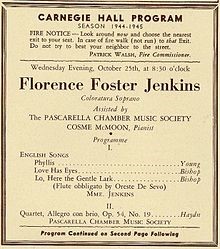 “Practice does not make perfect,” my friend, and award-winning magician, Michael Ammar, is fond of saying. “Rather,” he observes, “practice makes permanent.”
“Practice does not make perfect,” my friend, and award-winning magician, Michael Ammar, is fond of saying. “Rather,” he observes, “practice makes permanent.”
Thus, if we are not getting better as we work, our work will simply insure our current performance stays the same.
Now, before reading any further, watch a bit of the video below. It features Diana Damrau singing one of the most recognizable arias from Mozart’s, “The Magic Flute.” Trust me, even if you don’t like opera, this performance will make the hair on your neck stand on end.
All right, now click on the video below (and listen for as long as you can stand it).
No, the latter recording is not a joke. Neither is it a reject from one of the “GOT TALENT” shows so popular on TV at present. It’s none other than Florence Jenkins—an American socialite and heiress who was, according to Wikipedia, “a prominent musical cult figure…during the 1920’s, ‘30’s, and 40’s.”
How could that be, you may well wonder? Her pitch is off, and there are so many mistakes in terms of rhythm, tempo, and phrasing in the first 30 seconds, one quickly loses count.
The problem? In a word, feedback—more specifically, the lack of critical feedback extending over many years.
For most of her career, Lady Florence, as she liked to be called, performed to “select audiences” in her home or small clubs. Attendance was invitation-only–and Jenkins controlled the list. Her guests did their best not to let on what they tought of her abilities. Instead, they smiled approvingly and applauded–loudly as it turns out, in an attempt to cover the laughter that invariably accompanied her singing!
 Everything changed in 1944 when Jenkins booked Carnegie Hall for a public performance. This time, the applause was not sufficient to cover the laughter. If anything, it followed, treating the performance as a comedy act, and encouraging the singer to continue the frivolity.
Everything changed in 1944 when Jenkins booked Carnegie Hall for a public performance. This time, the applause was not sufficient to cover the laughter. If anything, it followed, treating the performance as a comedy act, and encouraging the singer to continue the frivolity.
The reviews were scathing. The next morning, the critic for the New York Sun, wrote, Lady Florence, “…can sing everything…except notes…”
The moral of the story? Practice is not enough. To improve, feedback is required. Honest feedback–and the earlier in the process, the better. Research indicates the keys to success are: (1) identifying performance objectives that lie just beyond an individuals current level of reliable achievement; (2) immediate feedback; and (3) continuous effort aimed at gradually refining and improving one’s performance.
Here’s the parallel with psychotherapy: the evidence shows therapist self-appraisal is not a reliable measure of either the quality or effectiveness of their work. Indeed, a number of studies have found that, when asked, the least effective clinicians rate themselves on par with the most effective–a finding that could well be labelled, “Jenkin’s Paradox.”
Evidence-based measures exists which can help therapists avoid the bias inherent in self-assessment as well as aid in the identification of small, achievable performance improvement objectives. Studies document, for example, how therapists can use such tools, in combination with immediate feedback and practice, to gradually yet significantly improve the quality and effectiveness of their therapeutic relationships–arguably, the most important contributor to treatment outcome.
Let me leave you with one last video. It’s an interview I did with Danish psychologist Susanne Bargmann. Over the last 5 years, she’s applied the principles described here in an attempt to not only improve her effectiveness as a clinician, but also in music. Recently, her efforts came to the attention of the folks at Freakonomics radio. As was the case when you listened to Diana Damrau, you’ll come away inspired!


Leave a Reply